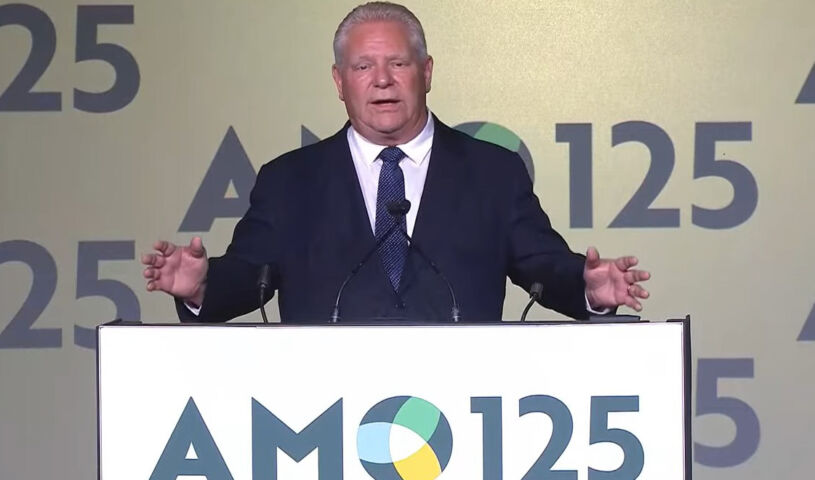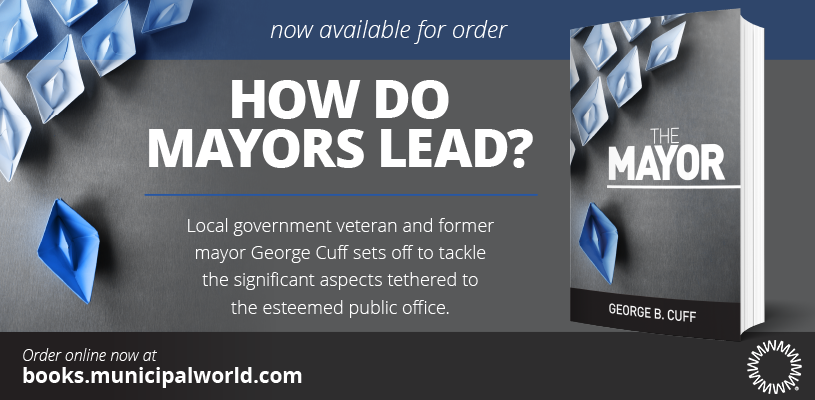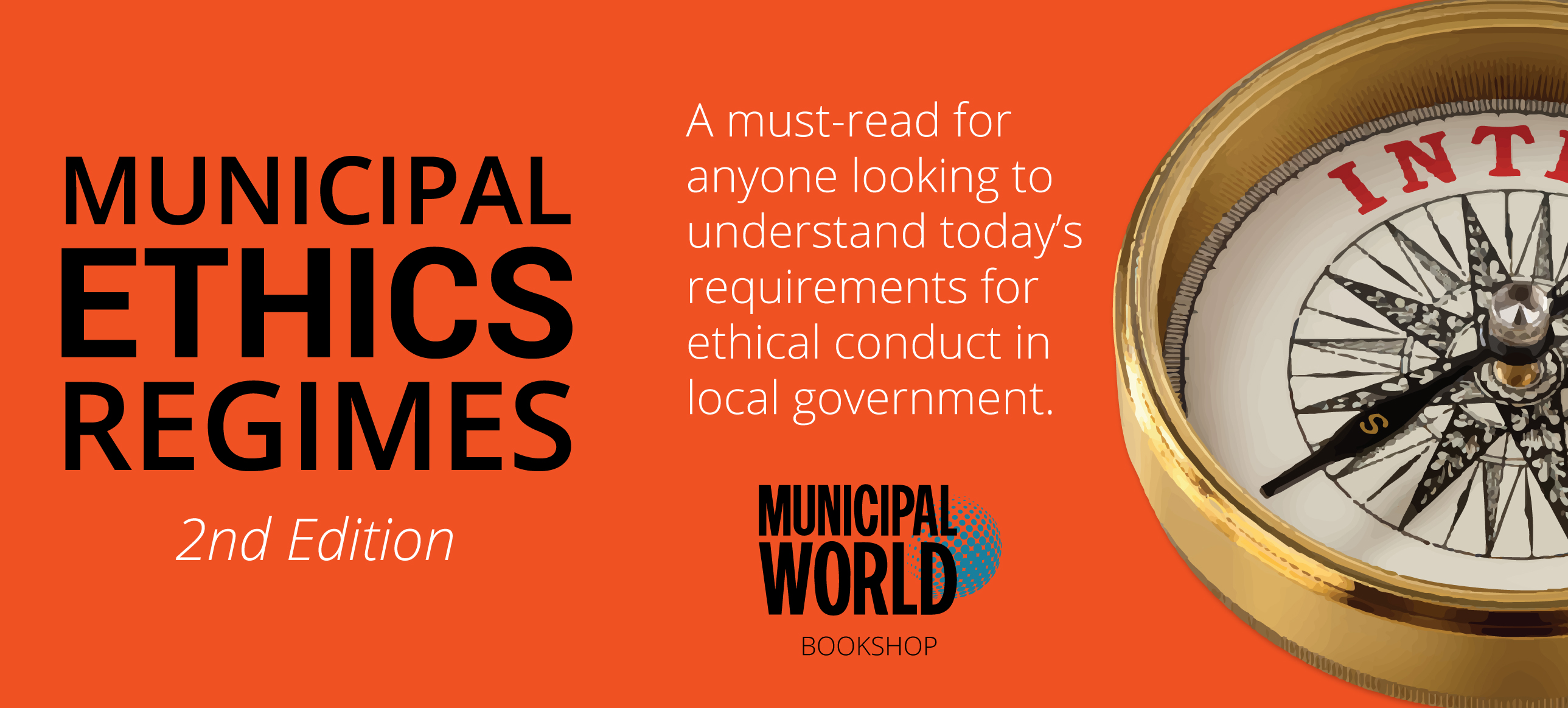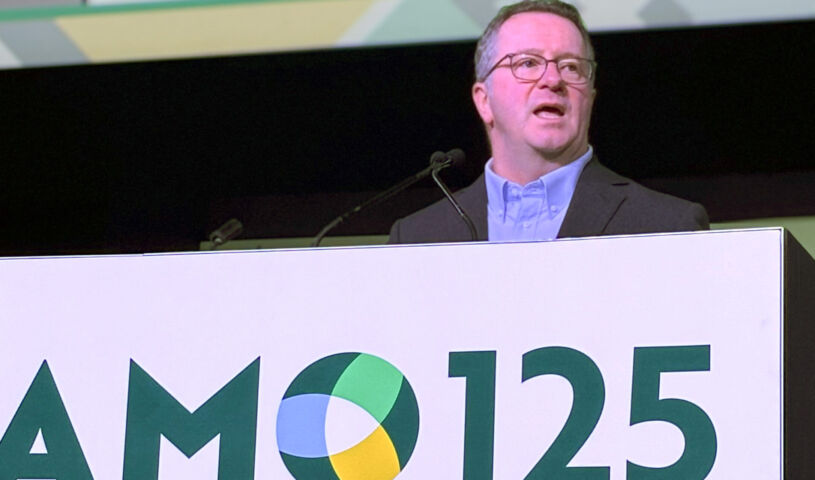Local leaders, provincial voices, drive AMO 2024 conversation
 Ontario Premier Doug Ford, along with the leaders of the NDP, Liberal Party, and Green Party, addressed more than 2,500 delegates at the Association of Municipalities of Ontario 2024 Annual General Meeting and Conference in Ottawa. Photo: Premier of Ontario YouTube
Ontario Premier Doug Ford, along with the leaders of the NDP, Liberal Party, and Green Party, addressed more than 2,500 delegates at the Association of Municipalities of Ontario 2024 Annual General Meeting and Conference in Ottawa. Photo: Premier of Ontario YouTube
The Association of Municipalities of Ontario (AMO) 2024 Annual General Meeting and Conference convened today for the final day of its 2024 conference. The conference, which began Aug. 18, saw more than 2,500 participants from hundreds of municipalities and organizations across the province gather at the Shaw Centre in Ottawa.
This year’s event features more than 60 speakers, sessions, and workshops, reflecting a broad scope of municipal challenges and responsibilities. Key session topics included housing and homelessness, how to fund infrastructure, the opioid epidemic, public safety, climate change, Indigenous engagement, and access to health care services.
The 2024 conference brings municipal and provincial officials together at a time when Ontario communities are facing complex challenges that are outstripping municipal resources. Municipal leaders across Canada have long been calling on provincial and federal governments need to provide more funding for community services and infrastructure.
“Municipalities deliver almost every public service that businesses and residents rely on, with the exception of primary health care and education. We need to work together to ensure that we’re using the best approaches for both orders of government and for taxpayers,” said Brian Rosborough, executive director of AMO.
That sentiment was echoed by many others at the conference. “Property taxation cannot fund the infrastructure costs and the increased demand on municipal services,” said Karen Redman, regional chair of the Waterloo Region. “We need a new deal.”
Premier Ford Addresses Delegates
In his speech at the conference, Premier Doug Ford said his government was making investments to improve Ontario’s infrastructure.
“As our population grows, we have to build the infrastructure needed to support this growth and ensure that it’s sustainable for generations to come,” Ford said. He added that the province has the most ambitious plans to build infrastructure “in the country’s history.”
Ford also announced a new online portal designed to help municipalities attract investment. Through the portal, municipalities will be able to upload information about commercial and industrial properties in their communities and provide companies with information about the property, including demographic trends, market analysis, and First Nations treaty areas.
“It’s going to be a powerful resource to help local governments and communities attract investments and jobs,” Ford said.
Provincial Leaders Have Their Say
The premier wasn’t the only provincial party leader in attendance at the conference.
NDP Leader Marit Stiles thanked municipal leaders for their service but was quick to add women need to feel welcome in office. She called for there to be a more respectful, civil environment. Stiles directly addressed the need for greater attention to be paid to the opioid crisis. Saying the province “has sidestepped its responsibility,” Stiles said the province needs to lead and pay its own bills. Municipalities, she added, have been left to deliver provincial responsibilities.
Ontario Liberal Leader Bonnie Crombie also thanked municipal leaders for their work. Crombie focused on the premier’s record, approach, and priorities, adding that her focus would be on community needs, health care, education, the economy, and affordability.
Crombie referenced the need to give municipal governments “a new deal,” adding that municipal leaders need to be respected, not criticized for advocating – especially when they want assistance with housing, the opioid crisis, infrastructure, and community hospitals.
Green Party Leader Mike Schreiner said he would “fix the broken fiscal framework” and create a dedicated ministry to help the homeless. Ontario has a “crisis of caring,” Schreiner said, adding that Ontario needs a provincial government that cares about the people it serves.
Like Stiles and Crombie, Schreiner said his focus would be on health care, education, and affordable housing. But true to form, Schreiner also said “a new deal” with municipal governments would focus on investing in climate-ready infrastructure to help build a fair and caring society.
Focus on Social, Economic Prosperity
One of AMO’s goals is a joint social and economic prosperity review with the Ontario government to look at how public services and infrastructure investments are funded provincially.
“Current funding relationships are undermining the prosperity of our communities. Housing, public safety, infrastructure, and health care are at risk if we don’t take action,” said AMO President Colin Best. “The goal is to make life more affordable for everyone – municipalities, the Government of Ontario, and the taxpayers we all serve.”
Last October, the association called on Ford to propose an update of the partnership between provincial and municipal governments. AMO says such a review would help to create a more sustainable and accountable provincial-municipal relationship.
“Ontario’s provincial and municipal governments have a strong track record of working together to solve complex challenges and develop sound public policy,” Best wrote in a letter to the premier. “We have previously come together in principles-driven processes to review provincial-municipal service delivery roles and fiscal architecture and to identify fixes. A similar process is needed now.”
Calls for Action on Homelessness, Addiction
Mayors on Ontario’s biggest cities have called on the province to do more to alleviate homelessness. Municipal leaders say they want the province to appoint a minister charged with tackling the housing and homelessness crisis.
“Have this minister strike an action table, bring together all of the experts in the field who have been willing and providing policy recommendations for many years, and develop a made-in-Ontario action plan,” said Burlington Mayor Marianne Meed Ward, chair of Ontario’s Big City Mayors Caucus.
In 2023, there were at least 1,400 homeless encampments in communities across the province, according to an AMO report. There were more than 2,600 opioid toxicity deaths in Ontario in 2023, according to the provincial Office of the Chief Coroner. Between May and July 2024, there were 936 suspected drug related deaths in the province. That represents a 53 per cent increase from the same period five years ago.
“There is a humanitarian crisis happening on our streets. People are dying and something needs to be done,” said Meed Ward. “We need the province, along with all levels of government and community partners, to implement the programs that have proven to be effective. This cannot wait. We must work together to solve this crisis now.”
In early August, Ontario’s Big City Mayors caucus launched the Solve the Crisis Campaign. They are calling on the provincial government to appoint a minister with the appropriate funding and powers to address housing needs, as well as mental health and addictions. They also want the province to commit to funding services unhoused people need and invest in 24/7 community hubs and crisis centres to relive pressure on emergency centres and first responders.
At the AMO conference, Toronto Deputy Mayor Jennifer McKelvie called for “ongoing sustainable funding for shelter services and supportive housing” and for better supports for people experience mental health crises.
A July report from AMO stated that homeless encampments are “symptoms of deeper system failures” and are the result of underinvestment by the provincial government areas like income security, affordable housing, and mental health and addiction supports and services. AMO said there is an “urgent need” for the province to provide clear guidance for municipalities on how they should deal with encampments set up by people who are unhoused.
“Taking on the homelessness crisis involves a whole-of-government approach that spans multiples ministries and multiple levels of government,” Meed Ward said. MW
✯ Municipal World Executive and Essentials Plus Members: You might also be interested in Philip Hicks and Franz Gangl’s article: Transforming municipalities: Crucial role of technology in workflow and records automation.
Ibrahim Daair is staff writer at Municipal World.
Sean Meyer is digital content editor for Municipal World.
Related resource materials:
- AMO conference serves to bring municipal leaders together
- FCM president focuses on communication in community building
- Conference life helps overcome professional obstacles



